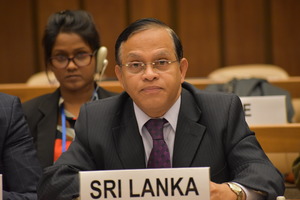
Addressing the Meeting of State Parties to the Biological Weapons Convention (BWC), Ambassador A.L.A. Azeez, Sri Lanka Permanent Representative in Geneva, stated that Sri Lanka accorded high priority to the effective implementation of the BWC - the first multilateral treaty to ban an entire category of weapons of mass destruction. Continuing drive towards universalization of this important Convention, he stressed, would strengthen the efforts of the international community against the use or threat of use of biological agents or deliberate use of diseases in breach of peace and security.
Elaborating national implementation measures and efforts under BWC, he referred to the Strategic Plan on Antimicrobial Resistance under 'One Health" concept in Sri Lanka. He further stressed that learning from the experiences of States Parties and sharing of good practices was important, and that such an inclusive approach would contribute to further improving policy and legal frameworks.
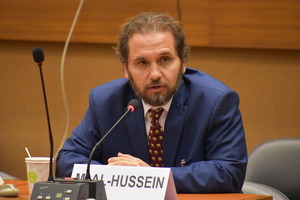
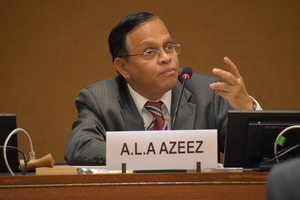
During my visit to Sri Lanka I saw extraordinary seriousness from the higher political level, down to official level to make Sri Lanka mine free by 2020’’, stated His Royal Highness Prince Mired Bin Ra’ad Bin Zeid Al-Hussein, the Special Envoy of the UN Secretary General promoting universalization of the Ottawa Convention, at a Panel Discussion, chaired by Sri Lanka Permanent Representative, Ambassador A. L. A. Azeez, in Geneva on 30th November 2018. He addressed a gathering of Ambassadors, delegates, civil society and other volunteers participating in the ‘Mine Free Sri Lanka 2020’ event, co-organized by the Permanent Mission of Sri Lanka in Geneva, and the Sri Lanka Campaign to Ban Land Mines.
The event took place on the sidelines of the 17th Meeting of States Parties (17 MSP) to the Convention on the Prohibition of the Use, Stockpiling, Production, and Transfer of Anti-Personnel Mines and on their Destructions’. Commending the commitment of Sri Lanka and all its implementing partners, Prince Mired lauded Sri Lanka’s progress as ‘a unique example’.
Making opening remarks as the Chair of the Panel, Ambassador Azeez stressed “the tremendous amount of work that was done on the ground, paving the way for the release of land and the resettlement of affected persons, makes the case of Sri Lanka distinct from other situations elsewhere’’.
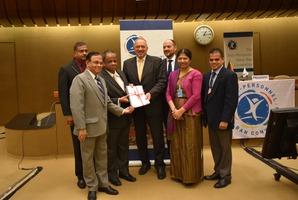
Sri Lanka presented the initial report under the Anti-Personnel Mine Ban Convention (Ottawa Convention) today, 29th November 2018 at Palais des Nations, Geneva.
Mr. Peter Kolarov, Senior Officer of the United Nations Office for Disarmament Affairs (UNODA) in Geneva received the country report from Secretary to the Ministry of Resettlement, Rehabilitation, Northern Development and Hindu Religious Affairs, Mr. V. Sivagnanasothy on the sidelines of the 17th Meeting of the States Parties (17MSP) to the Ottawa Convention currently underway from 26-30 November 2018.
The report had been prepared by the Ministry of Resettlement, Rehabilitation, Northern Development and Hindu Religious Affairs in collaboration with the Ministries of Foreign Affairs and Defence and other key stakeholders. The report outlines the progress made in mine action in Sri Lanka, acknowledging the assistance and support provided by international and national stakeholders as well as the work that is continuing to make Sri Lanka mine-free by 2020, and further support required to realise targets set.
Ambassador A.L.A. Azeez, Permanent Representative of Sri Lanka to the UN in Geneva, Mrs. Samantha Jayasuriya, Deputy Permanent Representative, Ms. Shashika Somaratne, Minister Counsellor, and Mr. Asanka Neel Fernando, Director, Planning of the Ministry of Resettlement, Rehabilitation, Northern Development and Hindi Religious Affairs were associated with Mr. Sivagnanasothy on the occasion.
Permanent Mission of Sri Lanka
Geneva
29 November 2018
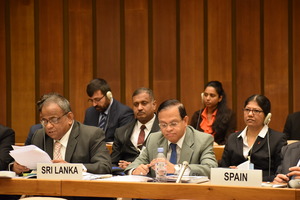
"“Making Sri Lanka a mine free country by 2020 remains our goal and vision", remarked the leader of the Delegation of Sri Lanka to the 17th Meeting of State Parties (17 MSP) to the Anti-Personnel Mine Ban Convention (Ottawa Convention) Mr. V. Sivagnanasothy, addressing the State Parties' Meeting in Geneva on 26 November 2018. He stressed that the ongoing mine action in Sri Lanka complemented the national drive towards strengthening harmony and co-existence, thereby contributing to the achievement of Sustainable Development Goals (SDGs) and economic and social prosperity.
Highlighting the different aspects of mine action progamme implemented by the Ministry of Resettlement, Rehabilitation, Northern Development & Hindu Religious Affairs, Mr. V. Sivagnanasothy, in his capacity as the Secretary to that Ministry, elaborated the 5-Year Strategic Plan (2016-2020) developed in consultation with the National Mine Action Centre and other stakeholders as well as measures taken to fulfil the commitments under the Ottawa Convention.
He also underlined Sri Lanka's commitment and dedicated efforts which led to remarkable achievements in the demining process. His progress update identified the District of Batticaloa as having been declared as a mine-free District in 2017, while contaminated areas in Sri Lanka had been reduced to 26 Sq.km in 2018. It also included an outline of comprehensive measures taken by Sri Lanka to destroy the stockpiles within the next 3 years as well as mine risk education being conducted in Northern and Eastern Provinces.
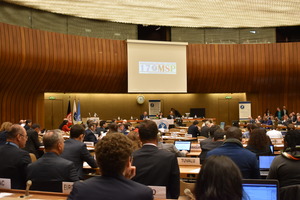
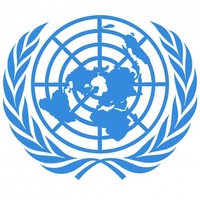
"Sri Lanka attaches great importance to the CCW, as one of the key instruments advancing humanitarian disarmament, addressing the concerns on maintaining the balance on military necessity and mitigating humanitarian concerns arising from the use of certain conventional weapons or weapons systems".
Minister Counsellor of the Permanent Mission of Sri Lanka Ms. Shashika Somaratne remarked while delivering Sri Lanka's Statement during the general exchange of views at the Meeting of High Contracting Parties of the Convention on Prohibitions or Restrictions on the Use of Certain Conventional Weapons Which May be Deemed to Be Excessively Injurious or to Have Indiscriminate Effects (CCW), on 21 November 2018 at Palais des Nations in Geneva.
Highlighting Sri Lanka's experience on the consequences of the use of landmines, it was noted Sri Lanka is on a firm path towards becoming landmine free by 2020, with the active support of stakeholders. While observing that Sri Lanka has made "considerable headway in determining the extent of contaminated area" as well as the mine risk education programme involving the affected community resulting in a drastic reduction of mine related casualty, Sri Lanka indicated that it will be in a position to share its experience in relation to mine action endeavours with interested parties.
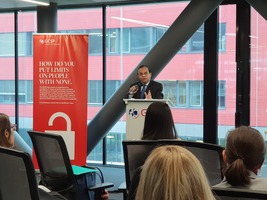
“Preventing the threat of use of biological agents is a key priority for Sri Lanka”, stressed Sri Lanka Permanent Representative in Geneva Ambassador Azeez, addressing the International Seminar convened by the Geneva Centre for Security Policy (GCSP) and the Implementation Support Unit (ISU) of the Biological Weapons Convention (BWC) on 'the importance of disease surveillance and alert mechanisms: lessons for the BWC’ held on 20 November 2018.
The Seminar focused on the operationalization of Article 7 of the Biological Weapons Convention (BWC), which accentuated the importance of technical assistance and international cooperation, to respond effectively to epidemics involving bio-agents.
Representing Sri Lanka at this health - security interface forum, Ambassador Azeez explained the existing disease surveillance mechanism in Sri Lanka, which comprised a wide range of medical and administrative networks including at national, provincial, and district levels. He also drew attention to the role and contribution of hospitals and primary health care units in addressing this challenge efficaciously as well as to laws and policies in place in this context. “Continuing work on strengthening the existing system involved further updating of policies and programmes to empower the National Disease Surveillance System as part of an integrated health-security mechanism”, he added.
